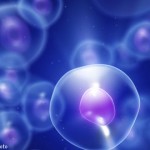So far, they’ve found immune enhancers that potentiated Type 1 T helper cells in vivo when co-administered with a TLR4 agonist, as well as repressors that were orally bioavailable and suppressed experimental arthritis in two animal models.
“If we’re going to do anything about all these noncoding regions that influence cancer and immunity and inflammation, [we] need improved cell-based assays that faithfully mimic disease-associated transcriptional programs,” said Dr. Carson, mentioning potentially using patient-derived monocytic and lymphocytic cell lines, or CRISPR gene editing. “We have the technology to do it.”
CAR T Cell Therapy, Reversed?
Michael Milone, MD, associate professor of pathology and laboratory medicine at the University of Pennsylvania in Philadelphia, showed how the strategy of CAR T cell therapy might be tweaked to treat autoimmune disorders.
In CAR therapy, developed for hematologic malignancies and now the subject of 123 trials around the world, T cells are drawn from patients, reengineered to express receptors for a targeted antigen, and readministered, where they propagate and have produced stunning, durable responses in lymphoma and other blood cancers.
“Could we reverse this CAR system, so we present the antigen instead of the antibody on the surface of the CAR, allowing us to get antigen-specific B cell targeting?” Dr. Milone asked.
Work at his center has focused on pemphigus vulgaris (PV), in which antibodies form against molecules called desmogleins that help form the adhesive junction between epithelial cells. With no FDA-approved therapies for the disease, treatment typically has involved mycophenolate, azathioprine or methotrexate. Rituximab has yielded good results, but the responses haven’t proved durable.
Capitalizing on knowledge of the structure of the pathogenic desmoglein antibodies involved in PV, researchers designed a chimeric autoantibody receptor (CAAR) to target specific desmoglein domains. In mouse models, this approach has eliminated desmoglein 3-specific B cells.2
Dr. Milone said the approach (and cell therapy in general) holds a lot of promise and could open a new avenue of therapies for rheumatologists.
“T cells are a very viable therapeutic platform,” he said. “We’ve only begun to scratch the surface on the types of cells we can engineer.”
Thomas R. Collins is a freelance writer living in South Florida.
References
- Chan M, Ahmadi A, Yao S, et al. Identification of biologically active pyrimido[5,4-b]indoles that prolong NF-κB activation without intrinsic activity. ACS Comb Sci. 2017 Aug 14;19(8):533–543.
- Ellebrecht CT, Bhoj VG, Nace A, et al. Reengineering chimeric antigen receptor T cells for targeted therapy of autoimmune disease. Science. 2016 Jul 8;353(6295):179–184.
